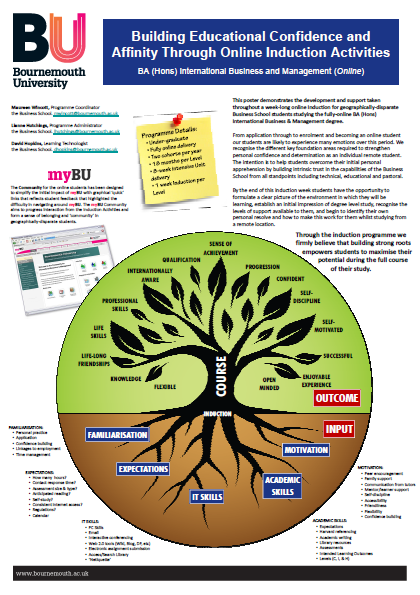2011: BU Enhancing Education
The Bournemouth University Enhancing Education Conference is an annual event at Bournemouth where posters and presentations are welcomed from all Schools and Partner Colleges of BU.
At this years Conference I was able to submit two posters and one presentation. Below are the details of the presentation and the two posters.
Many thanks to those of you who took the time to come and talk to me about them: if I was unable to speak to you then please leave a comment below and I’ll get back to you and answer your query shortly.
- “Footprints in the void: do students understand their ‘digital footprint’ in relation to their employability?”
Following up on the previous work and presentations I’d made to under-graduate students about whether students understand the impact their online activity can have on their employment prospects (see my previous blog post and reflection on it here: “Social Media and How (Students) Can Survive Online“) I joined with Debbie Sadd from the School of Tourism at BU to present our findings from the responses we obtained from the two sets of first year students we presented and questioned.
If you are going to quote or cite this poster presentation in any work please use the following details (in the style of Harvard Referencing):
Sadd, D. and Hopkins, D., 2011. Footprints in the Void: do students understand their ‘digital footprint’ in relation to their employability? In: Bournemouth University Education Enhancement Conference 2011, 4 May 2011, Bournemouth University, Poole, England. Available from: http://eprints.bournemouth.ac.uk/17757/.
- “QR Codes in Education: The Business School Experience.”
From our work using QR Codes in publications, presentations, and on printed material it was important we present our experience to the Conference in a way that informs as well as engages with the audience in a way that they can follow our work and see where we have added value to the student experience. Placement of the codes is as important as the creation of them, as well as making sure the intended audience is offered relevant content as a reward for scanning the code.
All codes we have used, and that are located on the poster, have shortened URLs for those without scanning capabilities, as well as being directed to websites that have mobile-friendly capabilities that are detected before the content is displayed.
If you are going to quote or cite this poster presentation in any work please use the following details (in the style of Harvard Referencing):
Hopkins, D. and Bobeva, M., 2011. QR Codes in Education: The Business School Experience. In: Bournemouth University Education Enhancement Conference 2011, 4 May 2011, Bournemouth University, Poole, England. Available from: http://eprints.bournemouth.ac.uk/17750/.
You may view and/or download this poster presentation from SlideShare here: QR Codes in Education: The Business School Experience.
- ” Building educational confidence and affinity through Online Induction Activities”
Those who have followed my work will know my interest in Induction activities for online and distance learners, that I completed part of my PG Cert qualification on this too. Along with colleagues from BU, this poster was presented to the conference to help demonstrate the need for a programme team that support online and distant learners in a very different way from normal campus-based students.
If you are going to quote or cite this poster presentation in any work please use the following details (in the style of Harvard Referencing):
Hopkins, D., Wincott, M. and Hutchings, L., 2011. Building educational confidence and affinity through Online Induction Activities. In: Bournemouth University Education Enhancement Conference 2011, 4 May 2011, Bournemouth University, Poole, England. Available from: http://eprints.bournemouth.ac.uk/17715/.
You may view and/or download this poster presentation from SlideShare here: Building educational confidence and affinity through Online Induction Activities.




















